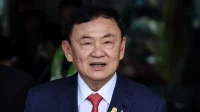In a startling turn of events, a video featuring a once-feared army general, who governed Indonesia with an iron grip for over three decades, has surfaced just ahead of upcoming elections, delivering a message from beyond the grave.
The video, garnering more than 4.7 million views on various platforms including TikTok, Facebook, and YouTube, portrays a stern-looking figure claiming to be Suharto, the second president of Indonesia. However, it quickly becomes apparent that the individual in the video is not the real Suharto, known as the “Smiling General” for his perpetual grin despite his authoritarian rule. Suharto passed away in 2008 at the age of 86.
This deepfake video, created using AI tools to replicate Suharto’s face and voice, has sparked controversy and raised concerns about the ethical implications of using deceased individuals for political purposes. Despite claims from figures like Erwin Aksa, deputy chairman of Golkar, one of Indonesia’s major political parties, that the video was intended to emphasize the importance of voting, many online critics have condemned the act as manipulative and disrespectful.
The emergence of such deepfake technology poses significant challenges for Indonesian politics, particularly in an era where online platforms play a pivotal role in shaping public opinion. With over 200 million voters expected to participate in the upcoming elections, the spread of deepfake content has the potential to sway millions and undermine the integrity of the electoral process.
Observers have noted that major political parties in Indonesia have increasingly turned to AI-generated deepfakes as part of their campaign strategies. From producing videos featuring deceased leaders to using AI to alter the appearance of candidates, these tactics highlight the growing influence of technology in shaping political discourse.
However, concerns about the misuse of AI in elections have prompted calls for greater awareness and vigilance. While some parties have embraced AI as a tool for engaging with voters, others, like former Jakarta Governor Anies Baswedan, have cautioned against its potential for misinformation and manipulation.
As Indonesia grapples with the implications of deepfake technology on its democratic process, watchdog groups and government authorities are faced with the challenge of safeguarding the integrity of elections in an increasingly digital age


